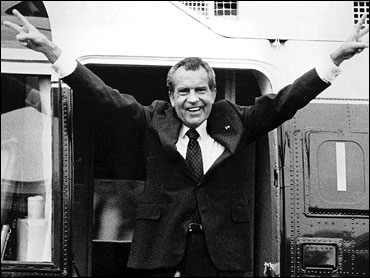
The Presidency
Power and Paradox

Learning Outcome: Evaluate the significance of the different sources of power that can limit or enhance a president's success in shaping foreign and domestic policy.
The office of the president of the United States is one in which there exists the opportunity for a single individual to provide leadership and influence in shaping the direction of the country and promoting major policy initiatives, both domestically and internationally. The paradox surrounding this seemingly powerful office is that a president can also be limited in their influence and fail in their efforts to shape policy. History has shown thye potential for expansion of presidential power in the case of Lincoln during the Civil War and Roosevelt during the Depression and WWII. NMore recently, the tendency toward an "imperial presidencvy" was seen in th Johnson administration and continued with Nixon. This changed in the aftermath of the Watergate scandal and Nixon's resignation and the subsequent weakening of the presidency. The presidents that followed worked to regain lost power and the Reagan administration made significant strides in this direction, but it was George W. Bush's expansion of presidential powers to combat terrorism that brought about the latest concerns over the constitutionality of presidential actions.
One consequence of the focus on presidential power is that people believe the president can do almost anything they want. This is evident during election campaigns when questions are never even raised as to whether the presidential candidates can actually do what they claim they will if elected. People often have unrealistic expectations of newly elected presidents and do not understand the true nature of presidential power. This causes some voters to feel disappointed, and even disillusioned, over the failure of presidents to fulfill their campaign promises. The harm to the democratic process is that the people's cynicism and lack of political efficacy result in the concentration of power into even fewer hands. A better understanding of the sources and limits of presidential power will allow you to participate more effectively in the policymaking process.
Many factors contribute to an individual president's successes and failures, but they can be seen most clearly by examining the sources of presidential power and understanding how these can work to enhance or limit the potential strength of the president. The most obvious source of power, as well as checks on a that power, is the U.S. Constitution. There are other sources of power that some presidents have been successful in utilizing to expand their influence, including the support of the American public and Congress' willingness to delegate power. Yet another factor related to the expansion of presidential power is the expansion of the executive branch. Today's president has significant resources within their administration, especially the many offices that make up the Executive Office of the President.
Do you feel you have a good understanding of the role of the president and the sources of presidential power?
Answer the following question to find out.

Don't worry if you answered incorrectly. This module is designed to clarify the basics and give you the tools to discover and analyze information on the president and presidential power. Remember to take notes from the documents and videos provided. This will help you when performing the activities and quizzes located throughout the module. It may also be helpful to utilize the links provided in the sidebar that contain additional text and explanation of the topics.
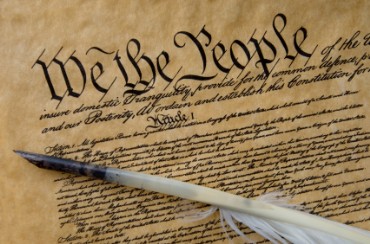
Learning Objective: Identify the expressed powers of the president and explain how inherent powers are linked to the implementation of these expressed powers.
The constitutional powers of the president are listed in Article II of the U.S. Constitution in a combination of clearly defined powers and more general roles that have created an office of both limited and expansive powers. The constitutional powers include the expressed powers of veto, pardon, appointment, etc., as well as the inherent powers associated with the president's roles as Chief Executive and Commander-in-Chief. The expressed powers are easier to understand and are often compiled in a simple list. You will find it easier to answer the questions in the crossword puzzle below if you make your own list as you read the paragraphs on presidential powers in Article II. The inherent powers are more complicated and open to different interpretation. You should consider what the writers of the Constitution had in mind and your own knowledge of presidential power when you read the description of the executive role and the military role contained in Article II. A major reason for the growth in the importance of these two roles lies in the president's responsibility for implementing laws and protecting national security, but this power is never completely unchecked, since other sources of the president's power, including Congress, the courts and the public, may limit or prohibit certain actions of the president.
Review the expressed powers in Article II of the Constitution and the video on presidential power, then test your knowledge and understanding of what you have learned.

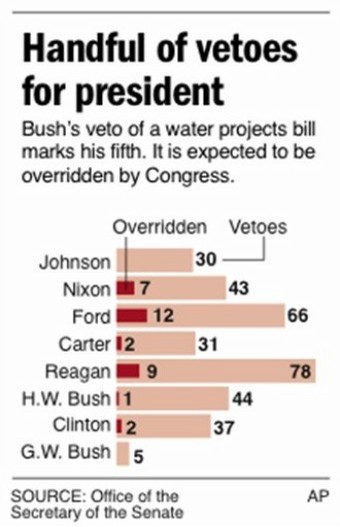

Now that you have a good understanding of the presidential powers outlined in the constitution, the next step is realizing how these words have been interpreted to expand presidential power. Deriving additional meaning from legal interpretations of the constitution has played a major role in the evolution of government and politics in the United States. In the case of the president, these inherent powers stem mainly from the "take care" clause that lays out the role of the president as chief executive and the designation of the president as "Commander-in-chief" of the military.
One of the first exercises of a president's inherent powers was Thomas Jefferson's purchase of the Louisiana Territory in 1805, even though the Constitution did not authorize any such action by the president. There was no serious challenge to his action and a precedent was set. In the 1930s President Franklin D. Roosevelt drew on the inherent powers when he expanded the size of the federal government in order to administer his New Deal programs designed to counteract the effects of the Great Depression. Beginning in 2002, President George W. Bush used the inherent powers when he suspended the civil liberties of foreign nationals held in a military prison at the U.S. naval base at Guantanamo Bay, Cuba, as part of the administration's war on terror. The controversy and legal challenges to President Bush's actions resulted in a series of Supreme Court cases that demonstrate the limits of inherent powers. As expected, the courts are reluctant to rule against the president, especially in times of war or crisis, but the U.S. Supreme Court twice informed President Bush that he did not have a "blank check" in time of war, meaning that there are still limits on presidential power. The following link contains audio of the arguments and opinions in the case, as well as a brief written summary.
Hamdan v Rumsfeld

A major part of the Bush administration's argument in Hamdan v Rumsfeld rested on the power inherent in the role of Commander-in-chief. While a majority of the Supreme Court disagreed, there is no doubt that presidents will continue to exert power in this way and sometimes they will be challenged.
The president has the power to issue executive orders that have the force of law. Executive orders carry the same weight as congressional statutes and have been used in a variety of circumstances to guide the executive branch's administrative functions. These have ranged from Truman's order to desegregate the military during WWII to Bush's creation of the Office of Faith-Based Initiatives.
Access the list of executive orders issued by President Obama by going to the briefing room on the White House's website. After reviewing the list of executive orders answer the following questions?
Which orders deal with routine operations you would expect to be handled solely by the president? Explain.
Which orders do you believe should have been addressed through the legislative process? Explain.
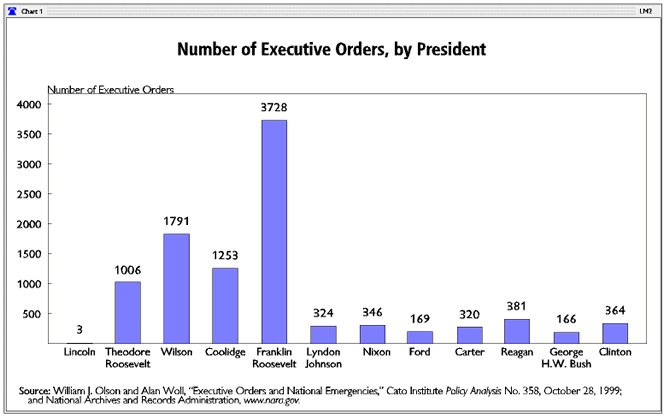
Having the power to create laws in the hands of one individual can be controversial and extensive use of the power will often draw criticism. George W. Bush issued 284 executive orders in his eight years in office. Do you consider this excessive? Examine the graph below and answer the question the follows.

Presidents can exercise executive privilege, the authority of the president and other executive officials to refuse to disclose information concerning confidential conversations or national security to Congress or the courts. George Washingtom was the first to make this claim based on the Constitution's separation of powers when he refused to grant Congress access to all documents pertaining to treaty negotiations. More recent examples have been challenged, such as Nixon's refusal to turn over taped conversations during the Watergate scandal in 1974, Clinton's attempt to prevent White House aides from testifying during the Monica Lewinsky investigation and George W. Bush's invoking executive privilege to prevent White House Counsel Harriet Miers and presidential Karl Rove from testifying before Congess over the firing of nine U.S. attorneys.
In general, the courts have allowed executive privilege in cases where a clear issue of separation of powers exists - as with respect to international negotiations and conversations regarding matters of policy or national security. The courts have tended to limit the use of executive privilege when presidents have exercised it in an effort to prevent the revelation of misdeeds by members of the executive branch.
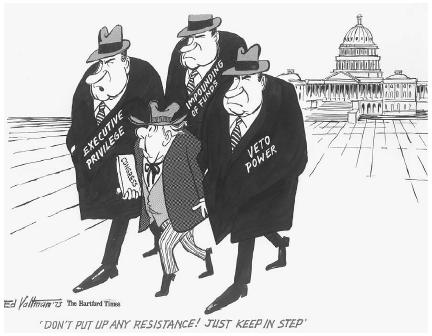
Yet another source of power and criticism over it's abuse has arisen in recent years. President Bush's administration was criticsed for its attempts to push the limits of constitutional powers through the use of signing statements, something few people had paid much attention to in the past. Bush's signing statement that challenged the major point of the amendment outlawing toture gained the media's attention and turned the spotlight on the large number of signing statements he had made that challenged various parts of legislation passed by Congress.
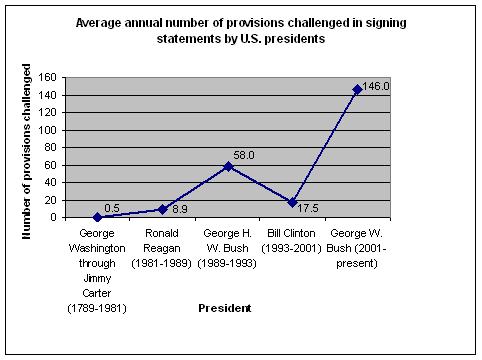

The two videos below give more information on what signing statemnts are and why they are controversial. They also present different sides of the debate over their importance and whether or not they are constitutional. You will need to watch both videos to answer the questions that follow and participate in a discussion board activity where you present your opinion on the use of signing statements.
What is the strongest argument made against the use of signing statements?
What is the strongest argument made in favor of the use of signing statements?
What do you think?
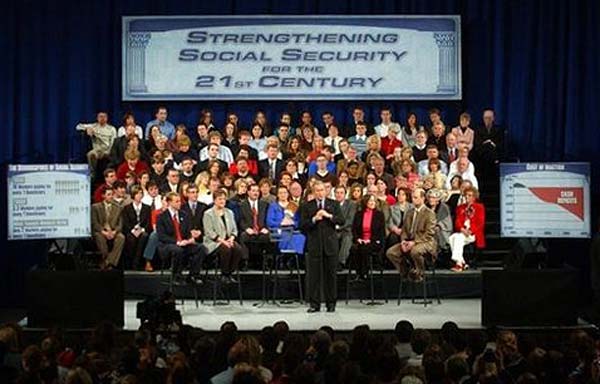
Learning Objective: Describe the role of the president in the legislative process and explain how certain factors influence a president's success in shaping policy.
The president's role in the legislative process is established by the expressed powers to veto legislation and to recommend legislation to Congress. The success or failure of presidents in using these powers to influence the policy agenda is effected by a number of factors, namely a president's popularity, their own personal skills and the circumstances that arise during their presidency. The photogragh of President Bush attempting to increase support for Social Security Reform illustrates the more sophisticated communications campaigns used by presidents to capitalize on the modern version of the "bully pulpit".
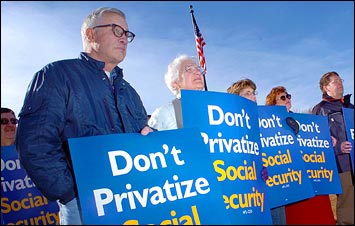
The president is in a unique position as the only nationally elected politician and one with tremendous ability to reach out to the public for support when needed. A newly elected president is given center stage in the policymaking process. Newly elected presidents usually claim to possess a mandate from the people that gives them an important role in setting the policy agenda for the legislature. Congress acknowledges the legitimacy of this claim by taking the president's policy priorities seriously, but it does not guarantee the passage of any legislation. President Bush declared Social Security Reform as a top priority after his re-election in 2004 claiming his victory gave him "political capitol". The president's position is strengthened by the level of popular support for himself and his proposals, but it may take additional work to be successful in passing legislation. The graph below helps illustrate how approval ratings can impact a president's success in Congress. In the case of Bush and his proposals for Social Security reform, his chances of success were never very good based on his approval ratings and strong opposition to privatization.


Leadership is one of the first characteristics that people think of when they consider the role of the president. Many voters even give it as the most important factor in choosing a candidate, but have trouble defining what they mean. Once in office, presidents are often praised or criticised based on evaluations of their leadership ability. This is often a reflection of their success in the legislative process or their performance in the face of a serious crisis.
There is no doubt that the president's role as Chief of State enhances their image as a leader and provides numerous opportunities to represent the nation, whether it be attending a formal state function, meeting with foreign dignitaries or visiting the site of a major disaster. The people look to the person that symbolizes the nation , both in times of triumph and crisis, and place their trust in their ability to decide on the best course of action.
The president's leadership role extends to their particular political party. As party leader of one of the two main political parties, the president exerts influence over the party's legislative agenda and asserts influence in the party's operations by selecting the national party chair and serving as the party's premier fund-raiser. Of course, these powers are dependent on the president's popularity and may change as circumstances change. A key determinant in the power of party leadership is the strength of that party in the legislature. It is logical to assume that a president will benefit most when their party is in the majority in both houses of Congress. The following graph illustrates the success of various presidents in the legislature based on votes on major issues supported by the president in times of party majorities, as well as when divided government exists.
The ability to get legislation passed can be significantly impacted by the president's own personal skills in bargaining and negotiating with key members of Congress. President Johnson was known to have a fairly aggressive style as illustrated in the photograph. His persistence in the face of opposition to major legislation, including the Civil Rights Act of 1964 and the creation of Medicare in 1965, helped overcome decreasing popular support. Other legislative skills may be more strategic and include focusing on winnable battles, compromising to win concessions and using the threat of veto to get changes made in bills throughout the legislative process.
The graph on presidential vetoes in the preceding section on constitutional powers, illustartes the relatively low number of vetoes and the even lower number of veto overrides. This is largely due to the more effective use of the veto as a threat that creates an incentive for Congress to work with the president to create legislation acceptable to both. Knowing when and how to use this power, along with other negotiating skills, can lead to greater success in passing legislation and stopping unfavorable legislation.
Modern president's particularly need good communication skills and the ability to persuade members of Congress and the public that their political agenda is the correct one. Presidents have one of their best opportunities to make their case when they address Congress each year at the beginning of the new session. The following video contains highlights of President Obama's first speech to a joint session of Congress in January 2009. He addresses a number of priorities in his legislative agenda and arguments why these policy goals should be the immediate focus of Congress.
What are the policies Obama identifies as the most pressing issues that need to be addressed by Congress?
What are his arguments for why these issues are so important?
Do you agree or disagree with his analysis? Explain.
The president's power as Chief Executive could not have grown without the expansion of the executive branch, which occurred largely through congressional legislation that created new departments and agencies with the authority to administer programs under the leadership of the president. The tendency to hand over authority to the president and the executive branch has increased as complex and controversial legislation have made it increasingly difficult for the legislative process to arrive as workable solutions to our nation's problems. This problem is clearly identified and explained in greater detail in the module on the Legislative Process. Congress is also more likely to delegate additional power to the president in times of crisis or war.
Franklin Roosevelt's presidency created tremendous opportunity for increased presidential authority to deal with the Depression and WWII. The many programs collectively known as the New Deal, including Social Security and major public works programs, were passed by Congress and effectively delegated authority over their implementation to the president. These delegated powers have increased over time to include new departments that deal with labor, energy, transportation, education, and a range of other policies, as well as regulatory agencies active in areas as diverse as the financial markets and the environment.
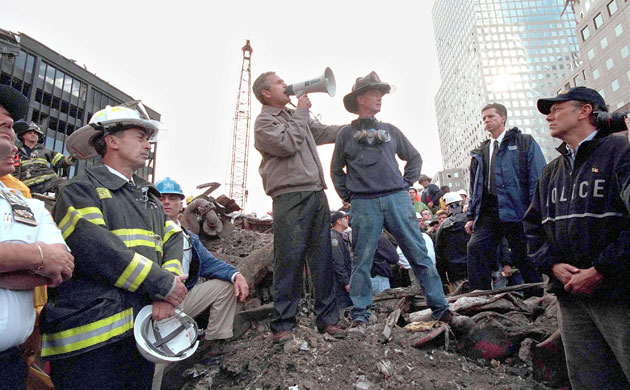
In the aftermath of the attacks on the World Trade Center and the Pentagon on September 11, 2001, Congress willingly passed the USA Patriot Act and the Force Resolution, two major pieces of legislation that increased the president's law enforcement and military power.
As you read the two resolutions below, compare their wording and determine Congress' rationale behind ceeding war power to the president.
Gulf of Tonkin Resolution
Force Resolution

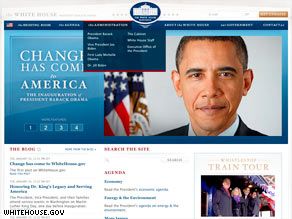
Learning Objective: Describe the major components of the president's administration, including the individual offices and the policymaking bodies within the EOP and the cabinet, and explain how they have contributed to the growth in presidential power.
As chief executive, the president is constitutionally charged with ensuring that the "laws be faithfully executed." Today this responsibility means that the president oversees a bureaucracy of over 4 million government employees, including the members of the military, while presiding over an astonishing $3 trillion annual federal budget. In addition, as we now consider, the president is the leader of the executive branch of government, which includes the vice president, the cabinet, the offices within the White House, and the entire federal bureaucracy. In his power to choose numerous staff members, policy advisers and top administrators, the president assembles an administration with a wide array of skills, experience and expertise that can work to multiply the power and the resources of the executive.
The president has a hand-picked partner in their chosen running mate for the office of vice-president. Vice-presidents have often been perceived as weak and ineffectual in the past, known more for serving a largely ceremonial function that revolves around activities such as attending state dinners, visiting foreign nations, and attending the funerals of foreign dignitaries. But vice-presidents may have more substantive responsibilities, depending on their skills and the needs of the administration. Sometimes, for example, a vice-president acts as legislative liason with Congress, particularly if the vice-president has more experience in dealing with the legislative branch than the president. Such was the case with Al Gore, who had served eight years in the House of Representatives and eight years in the Senate, wheras the president undre whom he served, Bill Clinton, lacked Washington experience. The same could be noted in the current vice-president, Joe Biden, whose thirty-six years in the U.S. Senate brings valuable legislative experience to the administration. Other experience can effect the role of the vice-president. Dick Cheney's experience in foreign policy and national security determined the pivotal role he played in developing the foreign policy of George W. Bush's administration.
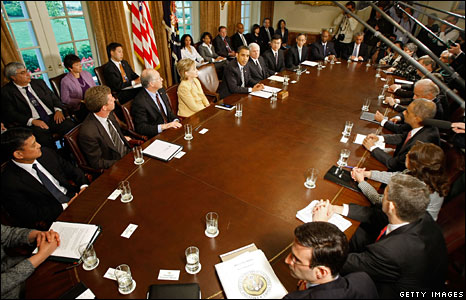
Since George Washington's presidency, every president has depended upon the advice of a cabinet, the group of experts choosen by the president to serve as advisers on running the country. These advisers serve as the heads of each of the executive departments and are known as the secretary of that department, except for the head of the Department of Justice, who is called the attorney general. For a full listing of all the cabinet members, go to the White House website's Cabinet page. Note that the officers are listed in the order of presidential succession, with the top four department heads reflecting their importance in the administration. The newest department is listed last, followed by six additional administration officials that have been designated cabinet rank.

Whereas the cabinet usually functions as an advisory board for the president, the Executive Offife of the President (EOP) typically is the launch pad for the implementation of policy. The offices, counsels and boards that comprise the EOP help the president to carry out the day-to-day responsibilities of the presidency. A complete list of all the offices that make up the EOP can be found on the White House website's EOP page. You should note that the economy and national security dominate the focus of these offices, with several of particular importance, namely the White House Office, the National Security Concil, the Office of Management and Budget and the Counsel of Economic Advisers. These offices are crucial not only because of the prominent issues with which they deal but also because of their strong role in developing and implementing policy in these issue areas.
Another major role of many of the EOP offices is coordinating policies among different agencies and departments. This gives the president greater control over a huge fragmented bureaucracy with competing agendas and enhances the president's ability to shape foreign and domestic policy. The Council on Environmental Quality (CEQ) played a key role in the Bush administration by controlling regulations that were seen as threatening to many big businesses. In one case that drew media attention, the CEQ deleted large sections of the Environmental Protection Agency (EPA) report on climate change to lessen the case for limits on carbon emissions and other environmental regualtions.

The White House Office is part of the EOP. It includes the president's closest political advisers who attend to matters of daily concern for the administration, policy development, legal affairs, political affairs, press and public communications, legislative affairs, presidential travel, and the increasingly important arena of interest group relations. These appointees and their staffs, who require no Senate confirmation, review and analyze masses of information to help the president formulate policy proposals. The combination of expertize and loyalty among these key personnel has proven invaluable to presidents and will likely continue to increase the importance of this office in presidents' ability to deal with the ever growing number of issues requiring daily attention.
A key component of the president's power in making major decisions regarding foreign and military policies rests in the information and advise provided by the members of the National Security Council (NSC). Several important military, intelligence and diplomatic officials serve to facilitate the coordination of policy across different agencies. The NSC was created in 1947 during the Truman administration, but its power was greatly increased under Henry Kissinger's leadership during the Nixon administration. This concentration of power was seen as dangerous to some, since democracy and open government can be compromised by the demands of intelligence gathering and protecting national security. The Iran-Contra scandal during the Reagan administration seemed to validate the critics' concerns when the NSC organized and funded secret military operations against the Sandinista government in Nicaragua. The president and vice-president claimed no knowledge of the affair and the actions of the National Security Adviser, CIA Director and Pentagon official found to be responsible, were reputed to be the work of rouge officials operating on their own. An oficial synopsis of the NSC's function, history and current head can be found on the White House website's NSC page.
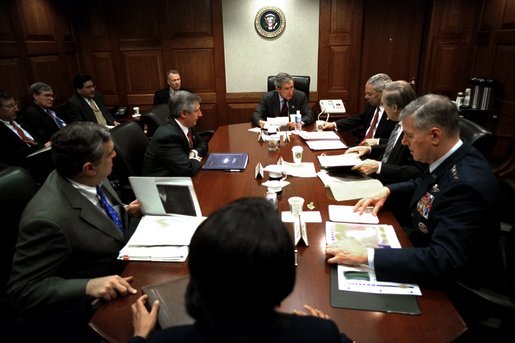
The photo shows members of the National Security Council meeting with President Bush in the Situation Room.
The Office of managemnet and Budget plays a major role in creating the president's annual budget which is submitted to Congress each January. The director of the OMB, who is often designted as a member of the cabinet, has a staff of about 600 career civil servants to help perform all of the functions associated with compiling revenues and expenditures, lobbying Congress to ensure key provisions remain in the budget, and managing the implementation of the budget by the different agencies and departments. More information can be found at the White House website's OMB page.
The Council of Economic Advisers (CEA) plays a key role in the president's influence over economic policy. These advisers provide the president with expert analysis of the U.S. economy and the global economy, as well as the economic impact of various federal programs and policies. Their recommendations on the actions that need to be taken to boost the nation's economy and create jobs are the basis for the president's economic policies. The president will urge Congress to follow his lead in addressing these economic priorities and work with other offices, namely the Secretary of the Treasury and the Federal Reserve Chair, to coordinate and implement these policies.
The power of these officials has been questioned at times and recent government actions to deal with the economic crisis are the subject of much scrutiny. The legislation to stimulate the economy, known as the Recovery Act, was passed by Congress at President Obama's urging and contains massive expenditures. To combate criticism, the Obama administration has promised transparency in spending and set up a Recovery Act website. Other controversial policies include the Troubled Assets Relief Fund (TARP) to provide money to banks and the partial government buyout of General Motors.
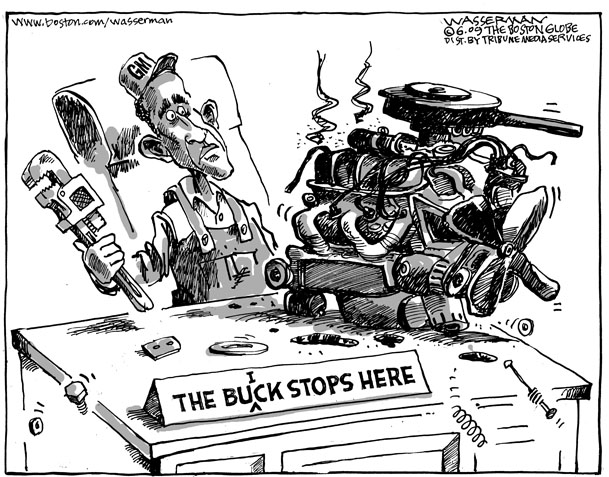
Explain the meaning of the cartoon in terms of the sources of presidential power and the limits on presidential power.
Write an analytical essay that evaluates the strengths and weaknesses of the Obama presidency in terms of the sources of power and limits on power discussed in this module. Choose three examples in which President Obama has exercised his presidential power and the discuss the relative success or failure of each action, making sure to include the counteractions and other relevant factors you uncover in your research.
Congratulations! (and condolences). You have been elected President of the United States of America. The American people, as well as many people around the world, are looking to you for leadership and solutions to some of the major economic, social and foreign policy issues that need to be addressed. You must now write a speech that explains what you will do in clear language that includes specific legislative proposals to Congress, as well as executive orders that you will issue to direct policies within the bureaucracy. Do not fall back on the use of vague proposals and worn-out talking points. The American people deserve batter than that.
When choosing your policy priorities consider issues such as the recession, job losses, mortgage foreclosures, healthcare, climate change, energy, taxes, Social Security, Medicare, U.S. policy in the Middle East, terrorist threats, nuclear weapons, free trade, globalization, or other issues you deem significant. Your speech should focus on three or four issues you have researched and formulated plans to address. Your proposals should be fiscally and technologically plausible. Cite your sources within the text of your speech and in a separate Works Cited page. The speech must be a minimum of 600 words. You should use more if necessary to express your ideas. Good luck! The world is waiting...
This could be done as a problem-solving exercise where students choose between options to address specific policy issues or crises that arise. It could be like a day in the life of the president where they walk through national security briefings, econimic policy meetings, press conferences, calls from foreign leaders, unexpected events, etc.
Students may choose a more creative option in which they produce a song, poem, video, painting, play, or other piece of original art that represents their personal view of the presidency and presidential power. The video below provides an example of what can be done.